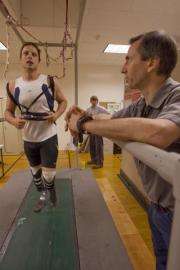Oscar Pistorius: Previously confidential study results released on amputee sprinter

A team of experts in biomechanics and physiology that conducted experiments on Oscar Pistorius, the South African bilateral amputee track athlete, have just published their findings in the Journal of Applied Physiology. Some of their previously confidential findings were presented to the Court of Arbitration for Sport (CAS) in Lausanne, Switzerland in May of 2008. Other findings are now being released for the first time.
A portion of the team's findings had been presented at the CAS to appeal the eligibility ban that had been imposed on Pistorius by the International Association of Athletics Federations (IAAF) barring him from sanctioned competitions, including the Olympics and World Championships.
The IAAF had claimed that the Cheetah Flex-Foot prostheses (J-shaped, high-performance prostheses used for running) worn by Pistorius give him an advantage over able-bodied runners.
The appeal was successfully presented on behalf of Pistorius by the international law firm of Dewey & LeBoeuf, who took the case on a pro-bono basis. The CAS concluded that the IAAF failed to prove that the biomechanical effects of the Cheetah prostheses give Pistorius an advantage over other athletes not using the prostheses.
The authors of the study are Peter Weyand of Southern Methodist University, Matthew Bundle of the University of Wyoming, Craig McGowan of the University of Texas at Austin, Alena Grabowski and Hugh Herr of the Massachusetts Institute of Technology, Mary Beth Brown of Georgia Institute of Technology and Rodger Kram of the University of Colorado at Boulder. None of the authors received compensation for the research or work on behalf of the CAS hearing. The group agreed to conduct the experiments with the understanding that they would be able to publish their scientific findings after the CAS ruling.
The experiments were conducted at the Locomotion Laboratory of Rice University in Houston, Texas.
The scientific team compared Oscar Pistorius to track athletes with intact limbs to evaluate his:
- Energy cost of running
- Fatigue resistance
- Sprinting mechanics
The team concluded that:
- Pistorius' energy cost of running is similar to that of accomplished male distance runners, but 17% lower than that of performance-matched male sprinters.
- Pistorius' ability to hold his speed over longer sprint races is identical to that of intact-limb athletes.
- Pistorius sprinting mechanics are markedly dissimilar to intact-limb track athletes.
At top speed:
- He exerts considerably less force on the ground in relation to his body weight than intact-limb runners.
- His foot is in contact with the ground 14% longer on each sprinting step
- He spends 34% less time in the air between steps
- He takes 21% less time to reposition (swing) his legs between steps.
In summary, the team concluded that Pistorius' physiology (energy cost and fatigability) is generally similar to that of intact-limb athletes, but his sprint running mechanics are markedly dissimilar.
The lead author of the study, Dr. Peter Weyand, indicated "I am pleased that we can now completely disclose our results because our study includes critical new data not presented in the CAS eligibility hearing. In addition to informing an interested public, full disclosure is in the best interests of Oscar Pistorius, other track athletes and the sport of Track and Field. The controversy raised by Oscar's inspiring performances presents a pivotal case for the future regulation of prosthetic and other technology in organized athletics. Accordingly, disseminating all the available facts is essential. I am relieved that all of our data are now available, particularly the mechanical data that are most relevant to the controversy and which were not part of the CAS hearing."
Source: Southern Methodist University (news : web)
















